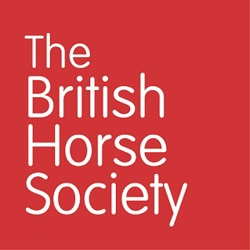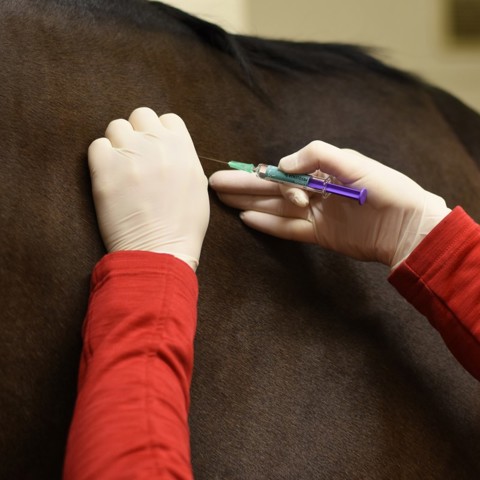Diseases can have a serious impact on equine health and welfare. Maintaining horse health and understanding how to reduce the spread of infections and diseases is essential. A disease outbreak on a yard can significantly impact activities, such as hacking, competing, travelling and the overall enjoyment with your horse1.
Advice specific to donkeys is available from The Donkey Sanctuary.
Understanding biosecurity
Biosecurity refers to practices that can be put in place to reduce the likelihood of disease introduction and spread. It’s crucial to maintain these practices at all times, and not just in the event of a disease outbreak. This helps to safeguard the health of all horses, including your own. It’s important to note horses that are unwell might not show physical signs of disease immediately – often they may have a high temperature, yet they could be contagious1.
Having a clear biosecurity plan for each equestrian premises is a great way to make sure all visitors and horse owners/carers are aware of the procedures in place and how to follow them.
Caring for your horse
chevron-down
chevron-up
-
- Regularly monitor your horse’s normal temperature. An increase could indicate illness. This is particularly important after attending an event or when moving to a new yard.
- Keep your horse’s vaccinations up to date:
- As a minimum, equine influenza and tetanus are recommended (although not contagious, tetanus is a life-threatening disease for horses)
- Vaccination against Equine Herpes Virus (EHV) can help prevent both respiratory disease and abortion caused by EHV-1 and/or EHV-4 and is especially recommended for horses under the age of five as they may be particularly susceptible to respiratory disease
- A strangles vaccine is also available
- Speak to your vet for further details and advice.
- Have a testing-led deworming programme in place and seek support from your vet to help develop a plan that best suits your horse and your yard.
Preventing the spread of disease
chevron-down
chevron-up
- Each field should have a separate water source to decrease the risk of disease between groups or individuals at the yard. For example, the strangles bacteria can survive in water for a few weeks.
- Make sure all boundary fences are secure, especially where the neighbouring premises keep horses. To prevent nose to nose contact over neighbouring fences, use well-spaced double fencing.
- If handling horses other than your own, wash your hands before and afterwards.
- Non-resident horses visiting a yard should be kept away from resident horses e.g. external visitors hiring an arena.
Prevent direct and indirect contact
chevron-down
chevron-up
Direct contact is when you or your horse touches another horse. For example, when horses touch noses.

Indirect contact is when equipment that may be contaminated is shared between horses. For example, tack and grooming equipment.

Ensuring good hygiene
chevron-down
chevron-up
- Have separate grooming equipment for each horse, and clean regularly.
- Thoroughly clean feed bowls and water buckets at least on a weekly basis2. A correctly diluted disinfectant can also be used for a deep clean.
- Disinfect your boots and change outer clothing after visiting other yards.
- Regularly clean tack, rugs and vehicles used to transport horses.
Good communication
chevron-down
chevron-up
- Make sure all yard attendees and visitors are informed of your biosecurity procedures and explain the importance of following your yard protocols
- Routinely monitor that all biosecurity procedures are being followed
- Reassess any biosecurity protocols yearly or following a disease outbreak to highlight any new areas of risk
Request a free disease prevention poster for your yard – contact welfare@bhs.org.uk or call 02476 840517.
Quarantine new arrivals
Quarantining all new arrivals to your yard is a vital disease prevention measure. Although the new horse may appear healthy, they could be harbouring disease and not yet showing any clinical signs. Some diseases, such as Equine herpes virus (EHV), can be reactivated by stressful situations such as moving yards.
Quarantine should last a minimum of 21 days3. To protect all horses on your yard, new arrivals should have no direct or indirect contact with the resident horses. Ideally new horses should be kept on a separate area of the yard. If this isn’t possible, make sure they’re on an end stable with an empty stable between them and their neighbour and ideally no horses entering or exiting past them.
Enrichment
chevron-down
chevron-up
Use enrichment to provide mental stimulation, providing more natural behaviours for the horse and enhancing their wellbeing. This can include feed enrichment like hay balls, which encourages foraging and extends time spent eating.
When in quarantine, the horse’s interactions with others will be temporarily restricted. Make sure, where possible, that they’re still able to see other horses.
Testing
chevron-down
chevron-up
Ideally carried out prior to arrival (or once at the yard), tests are available to help detect a horse silently carrying strangles.
As a minimum, a parasite risk assessment should be carried out to determine if the new arrival may need treatment before being turned out to pasture. See the CANTER Guidelines for more information on this approach.
Field environment
chevron-down
chevron-up
Designate an area away from the other horses and provide a separate water supply. If space is limited, use well-spaced double-electric fencing as a minimum to prevent nose to nose contact.
Wash hands and disinfect boots
chevron-down
chevron-up
Wash hands and disinfect boots when you’ve attended to the horse(s) with one of DEFRA’s approved list of disinfectants.
It may also be beneficial to wear protective overalls that can be removed after handling horses in quarantine.
Vaccines
chevron-down
chevron-up
It’s recommended that all new horses are up to date with equine influenza and tetanus vaccines (tetanus is not contagious, but is extremely likely to be fatal). Seek veterinary advice for unvaccinated horses, those whose vaccinations have lapsed and vaccinations available for other diseases.
Muck Management
chevron-down
chevron-up
To prevent any spread of disease via contaminated muck, keep the quarantine muck heap separate. This also includes bedding that may appear clean, but the horse has been in contact with.
Temperature checks
chevron-down
chevron-up
A horse’s healthy temperature should be between 37.5-38.5°C. An increase or decrease in temperature can indicate that your horse is unwell. Monitor each horse closely and take their temperature daily to help spot potential problems early.
While this is the recommended health temperature range, it’s important to know what’s normal for your horse as this can vary between individuals 4. Knowing what your horse’s healthy normal is, will be essential for spotting potential health issues early.
Yard Visitors
You can help limit the risk posed by professionals attending to your horse by:
- Having access to only one entrance and exit into your yard.
- Where possible, keep parking away from horses.
- Asking all visitors to wear clean clothes and shoes, and where possible using foot baths to disinfect boots on entry and exit to the yard.
- Recording the dates and contact details for all yard visitors in case of a contagious disease outbreak.
Caring for horses during a disease outbreak
If you suspect a horse may be showing signs of illness or a contagious disease is confirmed, where applicable speak with your yard manager immediately and isolate the affected horse(s). Veterinary support will be essential to prevent the outbreak spreading and provide appropriate treatment or management for the affected horse(s).
It’s strongly advised that yards have a plan prepared in advance in the event of a disease outbreak. The strategy to eradicate and prevent strangles provides information on the use of a traffic light system for managing horses.
References
- Biosecurity - British Equestrian
- Cleaning Horse Feed Tubs and Buckets - Kentucky Equine Research (ker.com)
- McLinden, L. et al (2023) Advances in the understanding, detection and management of equine strangles. Equine Veterinary Journal. 35(12) P 662-672.
- Establishing a Yard-Specific Normal Rectal Temperature Reference Range for Horses - ScienceDirect




